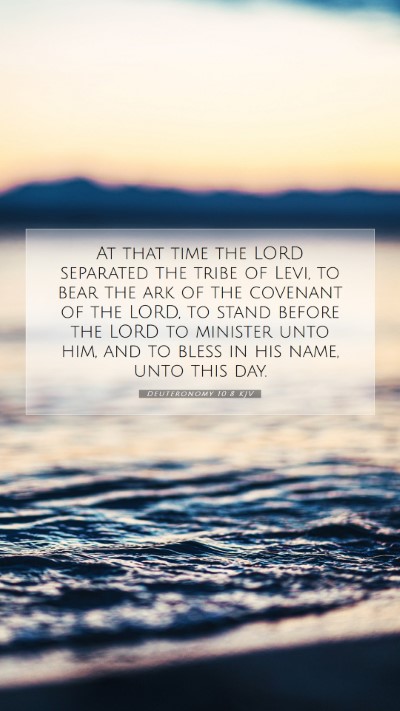Understanding Deuteronomy 10:8 - Bible Verse Explanation and Commentary
Verse: Deuteronomy 10:8 - "At that time the LORD separated the tribe of Levi to bear the ark of the covenant of the LORD, to stand before the LORD to minister unto him, and to bless in his name, unto this day."
This verse provides significant insight into the role and responsibilities of the Levites, the tribe chosen by God for special service. Here, we explore its meaning through the lens of respected public domain commentaries.
Overview of Deuteronomy 10:8
Deuteronomy, part of the Pentateuch, reiterates the laws and the covenant between God and Israel. Verse 10:8 highlights the divine selection of the Levites, illustrating their designated purpose concerning worship and service.
Significance of the Levites
The separation of the Levites is notable for several reasons:
- Divine Selection: God’s choice of the Levites underscores His sovereignty. They did not choose this role; rather, it was assigned by divine decree.
- Role of the Ark: The ark of the covenant symbolizes God’s presence among His people, where the Levites acted as mediators.
- Ministerial Duties: The Levites were tasked with ministering to the Lord, which involves rituals and offerings vital to the worship system.
- Blessing Authority: Their role also included pronouncing blessings, establishing them as critical instruments of God’s grace and favor.
Bible Verse Meanings and Interpretations
As we seek to understand this verse through various biblical commentaries, we find common themes:
Matthew Henry’s Commentary
Matthew Henry emphasizes the importance of the Levites in spiritual leadership and the significance of their duties. He notes that their service was not only about offering sacrifices but also about leading the people in worship and guiding them in their relationship with God. This highlights the need for dedicated leaders within the community.
Albert Barnes’ Exegesis
According to Albert Barnes, this verse reflects on God's unique choice and the responsibilities tied with this calling. Barnes draws attention to the Levites’ continuous service in the tabernacle and later the temple, symbolizing their perpetual commitment to God’s covenant. Their tasks exemplified a life wholly devoted to God’s service, which can serve as a model for believers today.
Adam Clarke’s Analysis
Adam Clarke further elaborates on the ritualistic responsibilities of the Levites, integrating historical context. He associates this separation with the broader narrative of Israel's journey, asserting that having a tribe dedicated to God’s service was essential for maintaining the covenant community. Clarke's insight invites readers to reflect on our commitment to spiritual service in contemporary settings.
Applications and Lessons
The significance of Deuteronomy 10:8 extends beyond historical context and commentary; it calls for:
- Spiritual Leadership: Encouraging modern believers to recognize and support leaders who serve God and the community.
- Commitment to Worship: Emphasizing the importance of dedicating time and resources to worship and service, akin to the Levites’ example.
- Covenantal Living: Inviting personal reflection on how individuals honor God in their daily lives as part of their covenant with Him.
Bible Study Insights
For those looking for deeper study on this verse and its implications, several related verses enhance understanding:
- Exodus 28:1 - God's selection of Aaron and his sons for priestly duties.
- Numbers 3:5-10 - The Levitical duties outlined further, establishing the tribe’s role in Israel's worship.
- 1 Chronicles 6:31-48 - The genealogical record of the Levites and their appointed roles.
Conclusion
Deuteronomy 10:8 encapsulates the essence of divine calling, service, and worship in the Israelite community. Commentaries by noted scholars offer profound interpretations that enhance our understanding of scripture, emphasizing the necessity of both spiritual leadership and communal worship. For those engaging in Bible study groups or seeking online Bible study tools, this verse serves as a foundational text for exploring the nature of God's covenant and the role of leadership within the church today.
By examining the meaning of Bible verses through diligent scripture analysis, we can apply these lessons to our lives, urging us toward a deeper relationship with God and faithful representation within our communities.


